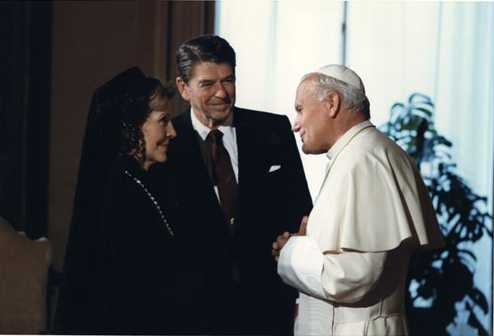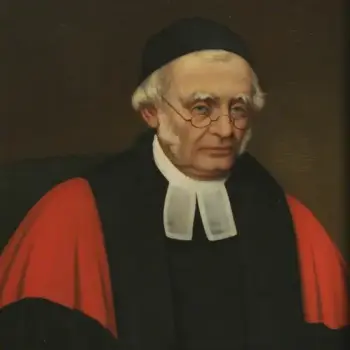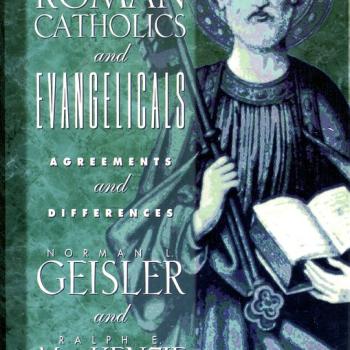
President and Mrs. Reagan meet Pope St. John Paul II, The Vatican, 1982. [public domain / Wikimedia Commons]
***
(originally edited and uploaded by Dave Armstrong from public bulletin board postings on 6 February 2002)
*****
I’m having trouble figuring out what, exactly, the problem is with the whole Assisi thing.
Pope calls together a bunch of religions to agree on the need for peace. Blessed are the peacemakers, etc. I’m tracking with that.
Pope says no we’re not praying together, everybody go to your own corner and pray according to the dictates of your conscience. But let’s work together as we can to keep the world from going up in flames. Lumen Gentium and Unitatis Redintegratio teach this. Okay. I’m still tracking.
I’m not seeing an affirmation that “We’re all really saying the same thing.” Far from it, I see the same clear statement of Dominus Iesus and Lumen Gentium that in the Catholic faith alone the fullness of God’s revelation subsists. Same deal on the distinction between the baptized and unbaptized. I’m still tracking.
About half the people on the list are really, really angry about all this. I’m not tracking. I haven’t the time to read the whole thread. Could somebody summarize for me what the problem is? How is telling somebody at an interreligious gathering “Work with us where you can and go off and pray according to your conscience (though the Catholic revelation is the fullness of the Truth) a craven capitulation to indifferentism, but telling somebody in your city they can have a mosque or a temple or a Lutheran Church or whatever a common sense acknowledgement of human conscience and freedom? It seems to me it’s all one or all the other. If it’s a wonderful testament to the Church’s anthropology that pagans are free to be pagans in a Catholic country, why is it a damning rebuke of the Church’s leaders that they apply exactly the same principle in a Catholic meeting? I don’t get it.
It seems to me that once the Church affirms the principle of religious liberty (as it should), it’s perfectly possible to hold a meeting like Assisi which, in essence, affirms what can be affirmed in common (like “Nuclear annihilation would be bad. Terrorists should really not blow up innocent people.”) and then tells the various participants “Go obey your conscience according to your religious tradition, just understand that we don’t affirm the truth of that tradition when it contradicts ours because our Tradition is the fullness of what God himself has revealed.” It appears to me that this is precisely what’s going on at Assisi. So I’m having trouble figuring out the problem. Do the critics of Assisi also think that Lumen Gentium and Unitatis Redintegratio were bad things?
Can somebody explain to me what I’m missing?
Between the sneers and John Lennon references, the slams of the Orthodox and the slams of those wretched Novus Ordo types, I could not actually find anything going on at Assisi which was, in fact, contrary to the Tradition or the teaching of Lumen Gentium and Unitatis Redintegratio. So I reiterate my question: Does this boil down to a rejection of the Church’s teaching on religious liberty? Or am I missing something? And if the Church’s teaching on religious liberty is wrong, what do critics of Assisi propose to put in its place? How should it be implemented on the ground? How far do you take the logic of a rejection of religious liberty? Vatican II urges common prayer where possible.
During the 40s, of course, Jews were housed in Catholic facilities, including the Vatican. They were permitted to pray there. Was this also a shocking betrayal of the uniqueness of the faith and a capitulation to indifferentism? If not, why not? If Jews can pray on Church property without it meaning “we’re really saying the same thing” why can’t the delegates to Assisi? – especially after the Pope explicitly says repeatedly, “We’re not praying together and we’re not really saying the same thing?” What’s so magical about being on Church property after a disclaimer like that?
I’m still having trouble figuring out the actual problem.
I don’t argue with that on the level of canons and whether it is legal or justifiable, etc. My questions have to do with expediency rather than lawfulness (which may distinguish me from Ferrara).
I think it does. One gets the impression that Ferrara, in some fever dream of canon law, has detected something unlawful. But it’s hard to tell since Ferrara piece was, in essence, a protracted sneer, written in the tone of one for whom Assisi was so self-evidently wrong that he never seemed to me to have gotten round to telling me why it was wrong. It reminded me of the tone of some anti-Catholic polemicists (as arch-Traditionalists often do) who seem to think that merely mentioning that a Designated Bad Guy says something proves that it is false. For myself, I found that when all the sneers had been waded through, I couldn’t yet detect what was actually wrong with Assisi other than that it reminded Ferrara of the 60s or something.
Nor do I sweat bullets of horror because a bishop is allowing himself to sit quietly and listen to someone else’s opinion. That can be a witness of humility to those with eyes to see it I suppose.
Good for you for saying that!
But what about questions such as …
“to what am I bearing witness if I am present at this event?”…”How will my fellow Orthodox understand this witness? How do I want them to understand it? How will I communicate that meaning?”…”How will other non-Orthodox Christians understand my presence here? How do I want them to understand it? How will I reinforce the communication of the correct interpretation?”…”How will a secular world interpret this? How do I want them to understand this? How will I reinforce that understanding in the secular world?”
To all those questions I’ve given an answer: the answer John Paul II supplied. Namely, I understood the meeting to be a meeting aiming, not toward affirming the interchangeableness of all religions, but toward the specific goal of civil peace in a world threatened by war and violence on an unprecedented scale. The meeting seems to me to affirm what can be affirmed in common among religions (i.e. Mass murder is bad. Civil peace is good). It did not in the slightest give anybody license to suppose the Church was relinquishing the claims to uniqueness it affirmed and continues to affirm in Dominus Iesus. So what’s the problem? “People might misunderstand” So what? They misunderstood Jesus in John 6 too. Is that a reason for avoiding speaking a complex and subtle truth?
When Orthodox Christians go to an Orthodox Church and pray “for the peace of the whole world” there is no question as to what is being witnessed to, it is the peace of Christ which passes all understanding. What is the picture of this peace? Is it the joy on the face of the well-educated school child who is reading on schedule and has completed his Hep B vaccination series on time and just got out of school for Christmas break and is going skiing with mummy and daddy in Vale?
This is caricature. The choice Assisi is addressing is not simply between the joy of the martyrs and the comfy cushiness of a spoiled yuppie. It is between a world of millions of burnt corpses and one in which human beings have something of a fighting chance of surviving long enough to hear the gospel. It quite frankly astonishes me to hear such a bare minimum call for justice equated with “utopianism” and dismissed as unattainable and foolish. Having one’s mind on the world to come (as the prophets surely did) is not a reason to abandon the call for common justice.
Or is it the silent source of tears of transformation shed in gulags, the sweet grace in the heart of one drawing her last breath in a battle with cancer trusting in God to redeem her out of all her troubles, or the ecstasy on the face of a bloody martyr shining like an angel?
The Church certainly does not deny that God’s grace can bless the martyr. It merely goes on saying that, though Maximilian Kolbe became a saint at Auschwitz, this does not mean that Auschwitz ought not be opposed.
These two visions are not the same thing at all and the world and sadly many Christians know only the former. The type of peace that can be delivered by technology, education and good government. One is utopian and worldly and ultimately meaningless apart from Christ. The other is everything worth living and dying for. Do these gatherings teach this to those who don’t know?
As I say, I find this simply incredible that you should ask this. Cancer can lead people through suffering to Christ. Therefore, to seek a cure for cancer is “utopian and worldly and ultimately meaningless apart from Christ”. Granted that, “apart from Christ” it’s utopian and worldly. But what about with Christ? Thousands of Catholic hospitals are not testament to utopianism, but to the common sense Christian mission to prevent evil, cure sickness, and do good. The attempt to find some way in which to prevent the evil of war is and expression of the same mission. “But war is inevitable.” Fine. So is cancer. So is illness, and traffic accidents, and all the other problems of this world. But to declare that an attempt to stop them is “utopian” is simply unfathomable to me.
Christians should give cups of cold water, but if they are to do it in Jesus’ name they need to bear witness to the story of Jesus; the story of God become man, who for the love of man accepted sin, death and every affliction of the evil one on himself that we might know a peace from the communion of His very life; this life that can never be found in the so called peace of this world. The desire that “Nation not lift up sword against nation” translates to the godless yearning for the tower of Babel more easily than a Godly longing for the New Jerusalem.
And, of course, there is quite literally no voice anywhere on the world stage or at any time in human history that has borne witness to Jesus Christ to more people than that of John Paul II. Quite literally no one has spoken of Jesus Christ and the truth of the Christian faith to more people than he has. Ever. It is quite amazing to me that all that is suddenly forgotten because of Assisi, even though John Paul makes it crystal clear that only in Christ is peace and the fullness of truth found and that other religions are not affirmed as being just as true as Catholic Faith.
The world doesn’t understand this, and hanging around in robes bearing witness to a common desire to avoid nuclear annihilation is a confusing message at best, just as good to send my plumber on my behalf as a bishop for that statement. Don’t carry out the Gospel book to an event if you think you are bearing witness to the utopian vision shared with everyone else, only carry out the gospel if you are ready to tell someone how their vision is a pile of dung without the Lord.
This is, once again, the “don’t speak or act if somebody might misunderstand” approach, which gets nothing done. The Pope, of all people, is almost uniquely aware of the difference between utopianism and Christian faith (he’s lived under two utopian systems). He’s written extensively on the impossibility of utopian schemes. The Catechism he promulgates specifically warns (#676): “The Antichrist’s deception already begins to take shape in the world every time the claim is made to realize within history that messianic hope which can only be realized beyond history through the eschatological judgement. The Church has rejected even modified forms of this falsification of the kingdom to come under the name of millenarianism,[Cf. DS 3839.] especially the ‘intrinsically perverse’ political form of a secular messianism. [Pius XI, Divini Redemptoris, condemning the ‘false mysticism’ of this ‘counterfeit of the redemption of the lowly’; cf. GS 20-21.]”
So I think it extremely unlikely that he now imagines that the goal is a secular utopia of religious leaders singing Kumbaya. Rather, I think it obvious he is acting on the sensible counsel of Lumen Gentium to work in common with people of good will for what can be achieved while, of course, not sacrificing the truth that the Church’s revelation is — alone — the fullness of God’s revelation.
Ignorant people can sure think stupid things. They did the same thing when Jesus said we had to eat his Body and Blood. So what? There will never be a shortage of people who think Jesus said “Blessed are the cheesemakers”. The question is not “What will clueless people think?” The question is, “Is this what the Church is really saying?” It is obvious to me that the Church has changed not a jot of its teaching but is simply implementing that teaching, affirming what can be affirmed (“a peaceful civil society is good and all men of good will should say so”), continuing to deny what must be denied (“Catholic faith is interchangeable with any other religious tradition”) and making that clear by, among other things, refusing to pray in common with non-Christians.
What kind of ratings could I get if I broadcast this whole shabang live in prime time? Do you think we could get a couple big sponsors and have U2 do an intro? Who does the Pope’s make-up?
I don’t think anybody but the archest of a tiny knot of arch-conservative Catholics thinks that John Paul II’s motivation is the hungry desire for face time on TV. The charge is preposterous on it’s face. Clueless people may well misunderstand Assisi (as they misunderstand John 6). But it takes a special sort of will to condemn to see in that humble man the sort of preening vanity and need for TV exposure that one would associate with Geraldo Rivera or Jerry Springer.
How does all this advance the cause of Christ in the world? Who knows, I sure don’t.
Oh, much the same way, the Pope’s labors for peace during the depths of World Wars I and II might. I remain baffled at how a Christian can see the struggle to keep millions of people from being incinerated, poisoned or plagued as, first and foremost, something sinister while working extra hard to not hear the obvious and clear calls that this struggle not be taken as an affirmation of indifferentism.
The Pope’s action here seems to me to be a no-brainer: work with people of good will to stop millions from getting killed. Make clear that this common effort does not mean all religions are the same and that our faith is not the full revelation of God. This he has done. I still am stunned that somebody would have a cow about this. Maybe people will think differently after nukes in suitcases go off in New York, Paris, and London. I dunno.
Or, more likely, 50 years from now somebody will be complaining that John Paul II was “bin Laden’s Pope” for failing to advocate the extermination of the Islamic world.
There was no prayer with heretics, much less pagans. There was, it appears, prayer with other Christians and no common prayer with non-Christians, as far as I could see.
Christians raised in other traditions are not, by the Church’s lights, “heretics” (see Unitatis Redintegratio).
“Religious involvement” with pagans is a rather fuzzy term that elides my point: how do you apply religious liberty on the ground? The Church specifically refused common prayer. What else should it do?
Ferrara is . . . the guy who was at bat for Gerry Matatics during his odd sojourn among the Traditionalist dissenting folks. His tone and attitude certainly are what I’ve encountered in that uniformly unpleasant and unhappy sector of Catholicism. He has the quality of those sectarians who are all in on the code and who all snort in union when you say the wrong word (“Heh! John Paul II!” is the common snort among those guys, sort of like “Heh! Evidentialist!” is a common snort in another sector of Christianity or “Heh! Protestant!” in the Fortress Catholicism wing). Once you’ve uttered a Disapproved Word, you’re a marked man, one of Them. Conversation among such folks has (as Ferrara’s piece has) the tendency to proceed as though the thing to be proven was proven merely by mentioning that a Disapproved Person was for/against it. John Paul II convened Assisi, ergo it’s stupid (guffaw, wink, snort). And if you ask, “But what, Mr. Ferrara, was wrong with the meeting?” you get the sense that the answer is a nudge in the ribs of his fellow Angry Trads, a whispered “Get a load of him!” and your name marked down as another in the cohort of Them who Ain’t Us.
I remain baffled about what, in the content of Ferrara’s protracted sneer, actually shows the Church was doing something wrong, contrary to the Tradition, or unbiblical. So far, the closest I’ve seen a real argument is “Ignorant people might misunderstand John Paul II’s action.” That’s pretty lame as an actual criticism.













